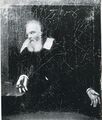Template:Selected anniversaries/January 7: Difference between revisions
No edit summary |
No edit summary |
||
| Line 4: | Line 4: | ||
||1502: Pope Gregory XIII (Ugo Boncompagni) born ... best known for commissioning and being the namesake for the Gregorian calendar, which remains the internationally accepted civil calendar to this day. Pic. | ||1502: Pope Gregory XIII (Ugo Boncompagni) born ... best known for commissioning and being the namesake for the Gregorian calendar, which remains the internationally accepted civil calendar to this day. Pic. | ||
File:Galileo E pur si muove.jpg|link= | File:Galileo E pur si muove.jpg|link=Galileo Galilei (nonfiction)|1610: [[Galileo Galilei (nonfiction)|Galileo Galilei]] makes his first observation of the four Galilean moons: Ganymede, Callisto, Io, and Europa, although he is not able to distinguish the last two until the following day. | ||
File:Anarchimedes measuring Galileo.jpg|link=Anarchimedes|1610: Rogue mathematician and alleged supervillain [[Anarchimedes]] remotely monitors [[Galileo Galilei]]'s discovery of Ganymede, Callisto, Io, and Europa. Galileo will later that his observations of the Galilean moons were corrupted by [[Anarchimedes]]' actions. | File:Anarchimedes measuring Galileo.jpg|link=Anarchimedes|1610: Rogue mathematician and alleged supervillain [[Anarchimedes]] remotely monitors [[Galileo Galilei]]'s discovery of Ganymede, Callisto, Io, and Europa. Galileo will later that his observations of the Galilean moons were corrupted by [[Anarchimedes]]' actions. | ||
Revision as of 17:34, 7 January 2020
1610: Galileo Galilei makes his first observation of the four Galilean moons: Ganymede, Callisto, Io, and Europa, although he is not able to distinguish the last two until the following day.
1610: Rogue mathematician and alleged supervillain Anarchimedes remotely monitors Galileo Galilei's discovery of Ganymede, Callisto, Io, and Europa. Galileo will later that his observations of the Galilean moons were corrupted by Anarchimedes' actions.
1732: Physicist and academic Laura Bassi publishes new class of Gnomon algorithm functions which convert Newtonian principles into an early version of quantum mechanics.
1827: Engineer and inventor Sandford Fleming born. He will propose worldwide standard time zones.
1834: Electrical engineer Zénobe Gramme computes simple Gnomon algorithm functions which accurately simulate the electrical motors he will build later in life.
1834: Scientist and inventor Johann Philipp Reis born. He will invent the Reis Telephone.
1881: Geologist and crime-fighter Sekiya Seikei uses Gnomon algorithm techniques to model the motion of an earth-particle during an earthquake, exposes criminal organization committing earthquakes for profit.
1882: Pharmacist, inventor, and industrialist Ignacy Łukasiewicz born. He built the world's first oil refinery and invented the kerosene lamp.
1933: Physicist Chien-Shiung Wu uses Gnomon algorithm functions to forecast outcomes for the Manhattan Project.
1939: Physicist Marguerite Perey identifies francium, the last element first discovered in nature, rather than by synthesis.
1943: Electrical engineer Nikola Tesla dies. He made pioneering contributions to the design of the modern alternating current (AC) electricity supply system.
2011: Cantor Parabola and Gnotilus at Athens used to convict supervillain Gnotilus in absentio.
2012: Mathematician Herbert Saul Wilf dies. Wilf specialized in combinatorics and graph theory.
2018: Robot 7 voted Picture of the Day by the citizens of New Minneapolis, Canada.














